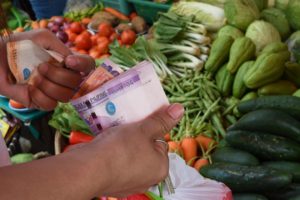MANILA -The Marcos administration is advised to perform a “delicate” balancing act to manage any potential risk from maintaining reduced import tariffs on certain agricultural products until the end of next year.
According to Rizal Commercial Banking Corporation chief economist Michael Ricafort, the government needs to import food items during periods when supply is not enough to meet the country’s requirements.
Ricafort said this could be done by providing and managing better information, especially on demand-supply balance, to prevent undue competition with local production when there is a glut or oversupply.
“The EO 50 [Executive Order No. 50] involves [a] delicate balancing act, especially from the point of view of local producers of meat and other agricultural products especially managing potential risk of oversupply/glut that could lower farm-gate prices and could lead to reduced earnings or even losses for some local producers,” he said.
READ: Lower import rates on rice, corn, meat extended until Dec 2024
Ricafort also said the penultimate objective was to retain lower import duties on meat and other agricultural commodities to reduce food prices and ease inflationary pressures for the benefit of consumers.
President Marcos recently signed an executive fiat that maintained the low import duty on rice, corn and meat for another year.
Under EO No. 50, meat imports (fresh, chilled, or frozen) are subject to a tariff rate of 5 percent for in-quota and 25 percent for out-quota.
The most favored nation tariff rate on rice is kept at 35 percent for both in-quota and out-quota imports. For corn, the tariff is still 5 percent for in-quota and 15 percent for out-quota.
Tariff rates will be subject to a review every six months. The National Economic and Development Authority committee on tariff and related matters is mandated to submit its findings and recommendations to the President, including analysis and monitoring of the subject commodities.
The President signed the order to ensure food prices are affordable amid the ongoing El Niño phenomenon, the continuing prevalence of African Swine Fever and the export ban of some countries.
READ: El Niño dry spell seen to prolong consumer price risks in PH
Based on the EO, the current economic condition warranted the implementation of lower tariff rates to maintain affordable prices, manage inflationary pressures, help augment the supply of agricultural commodities and diversify market sources.
Some agricultural groups lamented the issuance of the EO, noting that low import duties since 2021 have resulted in revenue losses while failing to bring down retail prices. INQ


